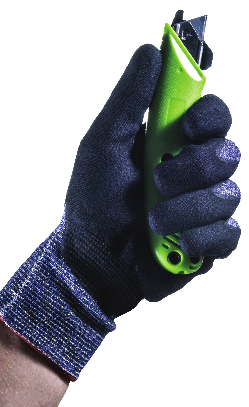The American National Standards Institute (ANSI) has released a new edition of the ANSI / ISEA 105 Standard (2016 ed.) The changes create new classification levels, which includes a new scale to determine cut score, and a revised method for testing gloves to the standard.
The new ANSI standard now features nine cut levels significantly reducing the gaps between each level and better defining protection levels for the cut resistant gloves and sleeves with the highest gram score. The new standard spans from 0 g to 6,000 g of cut protection. It’s tested by determining how much weight is required to cut through the glove material by a blade travelling 20 mm across the surface of the material.
Based on the chart below, A1 rated gloves provide the least protection, while A9 provide the greatest. Look for the new ANSI Cut Score badge throughout the catalog.
